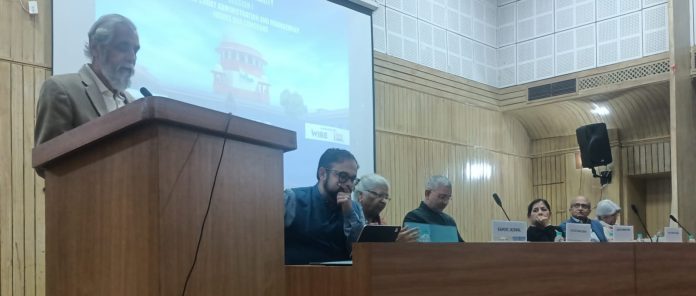New Delhi, Feb. 25: Justice B. Madan Lokur, while speaking on Judicial Management and Accountability at a seminar organized by Campaign for Judicial Accountability and Reforms, in collaboration with The Wire and LiveLaw, on Saturday, said, “An inordinate delay in adjudicating some burning issues is not good for the reputation of the courts.”
Justice Lokur elaborated, “Sensitive issues like the removal of Article 370 from Jammu and Kashmir, demonetization, electoral bonds, matters related to civil liberty and life of common people have witnessed a long delay in listing.”
“The delay in listing of these issues in the apex court and then delay in getting a decision from the court severely affects the quality of justice,” said former Supreme Court judge.
Justice Lokur said long delays in listing “burning issues” like demonetisation and abrogation of Article 370 of the Constitution and predictable pronouncements affect the quality of justice. This gives the impression that there is “something wrong” in the judicial system.
Justice Lokur also said, “The problem of listing cases is not new and it has been there for a very long time, especially in the Supreme Court. But today we are talking about it because the stakes today are much higher than many years ago.”
He said matters like demonetisation, Article 370 and electoral bonds for political funding were listed for hearing in the top court after many years. “We have issues relating to demonetisation, which, I think, have been listed after four or five years. Similar issues related to electoral bonds were listed after five years.”
“There is a perception today that when the case goes before the particular bench, this is going to be the result,” Justice Lokur said.
On the administration and function, Justice Kurian Joseph said, Under Article 229 of the Constitution, Chief Justices of High Courts are supreme. Yet, High Courts function through Committees. For the Supreme Court, though there are some Committees, there is no effective system in place like in High Courts.
Justice Joseph emphasized that there is a perception about Constitutional Courts focusing only on the ‘right to life’ part of Article 21 of the Constitution, while forgetting the second part i.e. ‘personal liberty’, even though the latter is the best part. He said, “Why should there be life without liberty? If you’re taking away the liberty part of a person, there’s no point in giving him the life part. I am of the strong view that our Constitutional courts should keep in mind Article 21 should be understood giving equal importance to both aspects of life and liberty. But the perception now is that life is of course guarded, but liberty is ignored.”
Justice Joseph also said the media houses, as the fourth pillar of democracy, have “failed to defend” the democracy, the Constitution and the truth.
Senior Advocate Kapil Sibal, while speaking on The Supreme Court’s recent trend on cases involving Civil Liberties and Political Rights, emphasized the glaring lack of procedural safeguards in India’s criminal laws, and said that, in stark contrast to ‘liberal’ countries, the police in India made arrests first merely on the basis of suspicion and then proceeded to investigate the alleged offences.
Sibal also drew attention to the problematic genesis of the country’s criminal laws, including the IPC and CrPC, inherited from British rule. These laws, he said, were crafted to suppress dissent and enable arbitrary arrests based on mere suspicion. Much of these provisions have also been retained in the new criminal codes which will come into effect from July 1.
The senior advocate’s concerns extended to what he described as arbitrary arrests and remands, particularly under special laws such as the Prevention of Money Laundering Act and UAPA. He said, “These special laws with special provisions, draconian provisions according to me are entirely unconstitutional.”




